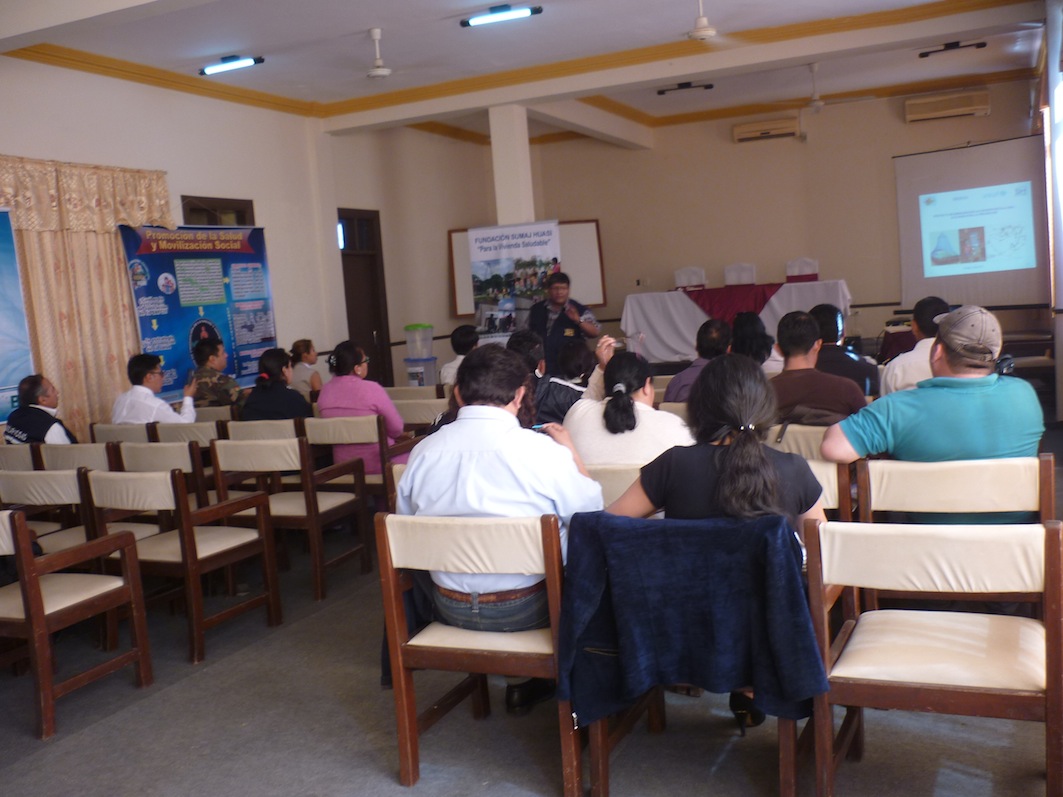Beni, which involved institutions as HEADQUARTERS Beni Program (Environmental Health), Autonomous Municipal Government, Self-Government Department of Beni and the Armed Forces – On Thursday June 30 the presentation of the project at the Hotel Don Bernardo Trinidad was held Bolivia (Armed Forces), the event was organized by the Sumaj Huasi Foundation “for healthy housing”.
The project is funded by UNICEF, implemented by the Sumaj Huasi Foundation in coordination with the Ministry of Health, the project will be implemented in 7 municipalities in the department of Beni, which are Trinidad, Riberalta, Guayaramerin, San Borja, Rurrenabaque, San Andrés and San Javier, these municipalities are considered the most vulnerable to viral disease recurrence zika as they have in detecting cases of dengue and chikungunya.
The project activities are framed in conducting training workshops aimed at technicians of the 7 municipal governments intervention and departmental Autonomous Government of Beni, in the proper use of storage containers of water, this subject will be replicated at the level of community and family also 70 committees water and sanitation will be trained in the handling and storage of safe water and sanitation, identification and analysis of the situation of high-risk areas for ZIKA, as held places where there are water containers, providing a safe and reliable water supply through the provision of ceramic filters candle, 7 committees local Emergency sanitation and response to outbreaks of ZIKA be trained to obtain favorable results are holding meetings intersectoral coordination with the Ministry of Environment and Water and the Ministry of Health to take joint actions and environmental methods for control and reduction ZIKA.
Through these actions, the project will strengthen local, municipal and departmental capabilities in water and sanitation for the control and reduction of transmitter vector ZIKA, he did know the Project Coordinator, Eng. Oscar Suntura.
Importantly, the project promotes equal participation of women, men, teenagers and children, since it is an integral part of the control and reduction of transmitter vector mosquito ZIKA linking objectively component Water, Sanitation and Hygiene. It also promotes diversity and cultural relevance as essential for generating sustainability of the actions part.
Training workshops water and sanitation, sanitation and environmental health response outbreaks ZIKA, handling and storage of safe water and sanitation, aimed at municipal technicians and water committees, starts from Monday July 4 in the municipality Rurrenabaque duration of the workshop three days, in the Municipality of San Borja starts on July 8 duration of the workshop three days, in the municipality of Riberalta starts on July 11 duration of the workshop three days, in the municipality Guayaramerin starts on July 14 duration of the workshop three days, in the municipality of San Javier starts on July 18 duration of the workshop three days, in the municipality of San Andrés starts on July 21 duration of the workshop 3 days, in the municipality of Trinidad starts on July 25 duration of the workshop three days, alongside the development of training workshops to identify areas of high risk of ZIKA for the provision of ceramic filters candle is made.
WHAT IS ZIKA
The Zika virus is caused by the bite of a mosquito and is classified as an arbovirus belonging to the flavivirus genus, which are those invertebrate animals such as mosquitoes and ticks transmit it to humans.
Aedes aegypti mosquito is the transmitter also diseases of dengue and chikungunya, the spread of infection is particularly evident in the rainy season, where the greatest number of infections.
Zika virus is transmitted to people primarily through the bite of infected Aedes mosquitoes, particularly Aedes aegypti in tropical regions. Aedes mosquitoes usually bite during the day, especially at dawn and dusk, and are the same that transmit dengue, chikungunya and yellow fever.
risk pregnancies, according to the World Health Organization (WHO) there is a possible link between Zika virus and microcephaly (small head) in newborns, so in December 2015 issued an international alert.
Aedes aegypti mosquito is the transmitter also diseases of dengue and chikungunya, the spread of infection is particularly evident in the rainy season, where the greatest number of infections.
Zika virus is transmitted to people primarily through the bite of infected Aedes mosquitoes, particularly Aedes aegypti in tropical regions. Aedes mosquitoes usually bite during the day, especially at dawn and dusk, and are the same that transmit dengue, chikungunya and yellow fever.
risk pregnancies, according to the World Health Organization (WHO) there is a possible link between Zika virus and microcephaly (small head) in newborns, so in December 2015 issued an international alert.


Leave a Reply
You must be logged in to post a comment.